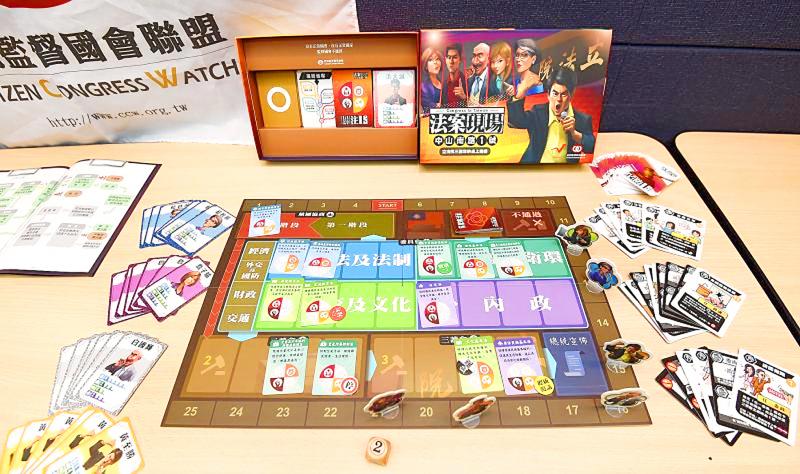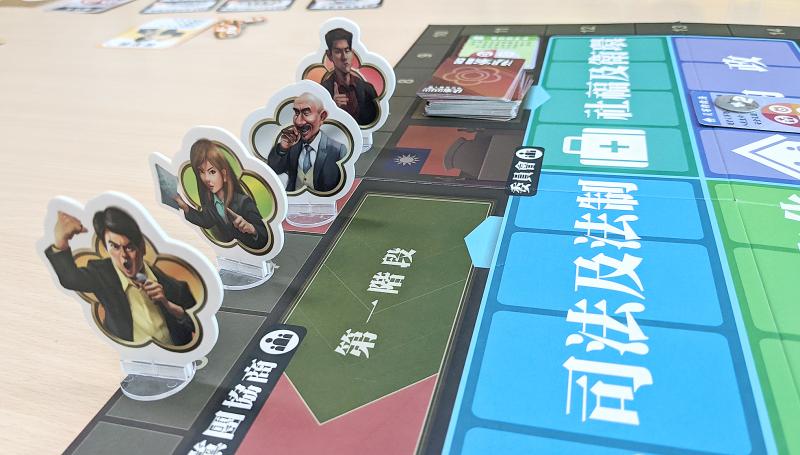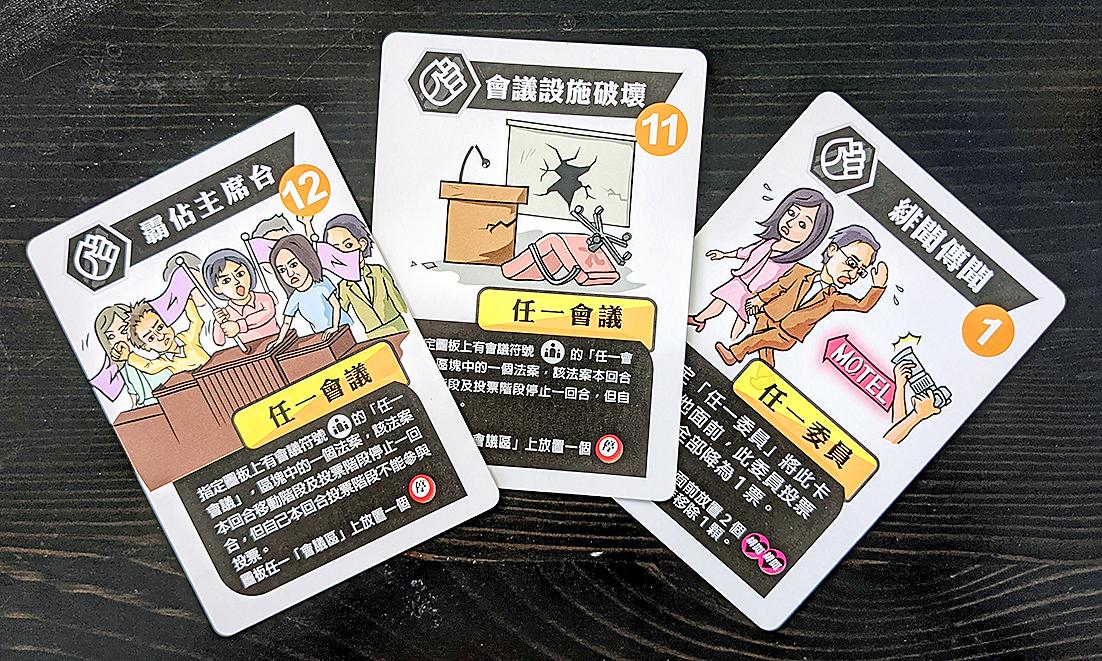There are no pig guts for me to throw in the legislative board game No. 1 Zhongshan S Road: The Scene of A Bill (中山南路一號 : 法案現場), so I trash the meeting room to delay the progress of a draft act I don’t like.
Such is real life in the nation’s cutthroat lawmaking battlegrounds, and this sort of sabotage happens more often than one thinks — just two weeks ago, opposition Chinese Nationalist Party (KMT) members smashed up the speaker’s podium to prevent Premier Su Chen-Chang (蘇貞昌) from delivering his policy report.
My wiley opponent is ready, however, and has switched meeting rooms ahead of time. So I hit him with a sex scandal where he’s photographed leaving a motel with a female colleague, which limits his ability to vote on bills until the public eventually forgets about his transgressions. He can hold a press conference to clear his name, but he doesn’t have the right card.

Photo courtesy of Citizen’s Congress Watch.
All this time, however, I’m working to block a bill that promotes gender equality, something that I would definitely not support in real life. But my party, or my character — who may or may not resemble a certain politician — does not gain much from supporting the issue. So I must shoot it down.
This is the juicy side of the Legislative Yuan that the public is more familiar with, but these extreme or backhanded actions are just one portion of the arsenal lawmakers rely on to further their agenda. For much of the time, I’m making actions such as “amending a motion” or “requesting a public hearing” to keep the bill in second reading, or rallying public support and launching petitions. That’s the real meat of the process, and is what the game aims to educate its players about.
ACCURATE SIMULATION

Photo: Liao Chen-hui, Taipei Times
After two years of fundraising and testing, legislative watchdog group Citizen’s Congress Watch finally released the game on Sept. 29, developed in conjunction with Soochow University’s (東吳大學) Legislative Research Center. While we hear about the legislature constantly in the news, the game is quite illuminating and, according to the legislators who tried it, an accurate simulation of the immense bureaucracy and political maneuvering that goes into passing a law.
The game is targeted at high school and university students, and Citizen’s Congress Watch staff have been holding sessions during civics classes as well as other events. Unfortunately it is only in Chinese, as it would be very beneficial to English-speakers who often feel bewildered by what’s going on in those chambers as well.
It was very helpful that the group sent several staff members to the Taipei Times’ office to explain the game and conduct an hour-long session, and like any quality board game it takes the entire hour and a few rounds to barely start settling into things. But the brief exposure already enhanced my basic understanding of how the legislature works.

Photo: Han Cheung, Taipei Times
Unless I’m extremely vested in a bill, I seldom follow its progress from start to finish. And when I do, I’m more interested in the issue and debates (and shenanigans) that ensue rather than the process itself. But sometimes I wonder how some bills get bogged down and stall only to resurface from time to time, while others get passed shortly after they’re brought up. I still don’t know what all of the terms in the game mean after just one session, but I’ve been noticing them more as I browse the news.
But most importantly, the game is enjoyable and quite competitive. The catch is that players are not aware of each other’s political inclinations, and they cannot see their actions on each bill, leading to a lot of guessing and observing. This part may not be as realistic, but it definitely adds another layer to the otherwise straight-up gameplay.
While I would like to have seen more outrageous antics — for example, there isn’t a card that allows me to physically assault my rivals, which is a time-honored tradition in Taiwan’s legislature — it’s still a highly effective means to make an often tedious subject fun.

Photo: Han Cheung, Taipei Times

On April 26, The Lancet published a letter from two doctors at Taichung-based China Medical University Hospital (CMUH) warning that “Taiwan’s Health Care System is on the Brink of Collapse.” The authors said that “Years of policy inaction and mismanagement of resources have led to the National Health Insurance system operating under unsustainable conditions.” The pushback was immediate. Errors in the paper were quickly identified and publicized, to discredit the authors (the hospital apologized). CNA reported that CMUH said the letter described Taiwan in 2021 as having 62 nurses per 10,000 people, when the correct number was 78 nurses per 10,000

As we live longer, our risk of cognitive impairment is increasing. How can we delay the onset of symptoms? Do we have to give up every indulgence or can small changes make a difference? We asked neurologists for tips on how to keep our brains healthy for life. TAKE CARE OF YOUR HEALTH “All of the sensible things that apply to bodily health apply to brain health,” says Suzanne O’Sullivan, a consultant in neurology at the National Hospital for Neurology and Neurosurgery in London, and the author of The Age of Diagnosis. “When you’re 20, you can get away with absolute

May 5 to May 11 What started out as friction between Taiwanese students at Taichung First High School and a Japanese head cook escalated dramatically over the first two weeks of May 1927. It began on April 30 when the cook’s wife knew that lotus starch used in that night’s dinner had rat feces in it, but failed to inform staff until the meal was already prepared. The students believed that her silence was intentional, and filed a complaint. The school’s Japanese administrators sided with the cook’s family, dismissing the students as troublemakers and clamping down on their freedoms — with

As Donald Trump’s executive order in March led to the shuttering of Voice of America (VOA) — the global broadcaster whose roots date back to the fight against Nazi propaganda — he quickly attracted support from figures not used to aligning themselves with any US administration. Trump had ordered the US Agency for Global Media, the federal agency that funds VOA and other groups promoting independent journalism overseas, to be “eliminated to the maximum extent consistent with applicable law.” The decision suddenly halted programming in 49 languages to more than 425 million people. In Moscow, Margarita Simonyan, the hardline editor-in-chief of the